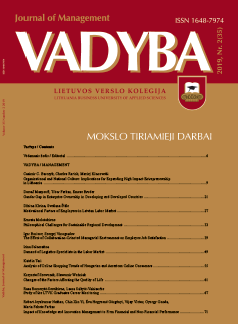THE EFFECT OF COLLABORATION-ORIENTED MANAGERIAL ENVIRONMENT ON EMPLOYEE JOB SATISFACTION
THE EFFECT OF COLLABORATION-ORIENTED MANAGERIAL ENVIRONMENT ON EMPLOYEE JOB SATISFACTION
Author(s): Borisov Igor, Sergey A. VinogradovSubject(s): Economy, Labor relations, Management and complex organizations
Published by: Lietuvos verslo kolegija
Keywords: innovation activity; creativity; working relationship; management environment; European Working Conditions Survey; job satisfaction; public & private sector;
Summary/Abstract: In our studies, we have assumed a causal chain that says managerial collaboration-oriented approach influence employee satisfaction which in turn influence intra-organizational outcomes (e.g., creativity and innovation). On the basis of existing works, we have made a score on the basis of mosaic statements presented in the European Working Conditions Survey (EWCS). In order to identify the main differences between EU countries, we made the distinction among five country groups based on their institutional conditions (i.e. social welfare system, labour culture issues etc.). The current research addressed the following hypotheses: (1) There are significant differences between the public and private sectors in employee’s assessment of the quality of collaboration-oriented management environment and their job satisfaction. (2) There are statistically significant differences in the quality of the working environment and the level of job satisfaction among the groups of European countries.To measure the collaboration-oriented managerial environment a set of 13 statements form the sixth EWCS questionnaire was selected. The same work has been done with job satisfaction. A factor analysis, cluster analysis, correlation analysis, Mann -Whitney and Kruskal-Wallis tests were applied to address the hypotheses. Cronbach's alpha was used to assess the internal consistency of each score.Results indicated a significant relationship between the elements of the collaboration-oriented managerial environment and job satisfaction for each factor examined. The value of score the collaboration-oriented management environment is higher in the public sector than in the private sector. The organizational trust indicator is significantly higher in the private sector in all country groups, except CEE. Analysis based on Mann-Whitney test leads us to the conclusion that we cannot talk about stable established patterns distributed among groups of countries.This research has started to understand how the organizational context impacts the collaboration-oriented managerial environment, organisational satisfaction, creativity, engagement further analysis of boundary conditions is needed. This may include organizational size, team size, geographic location and business environment and an expansion of the dependent variables. We suggest further research into these paradigms, understanding the employee impact of each paradigm under different organizational contexts.
Journal: VADYBA
- Issue Year: 35/2019
- Issue No: 2
- Page Range: 39-48
- Page Count: 10
- Language: English

